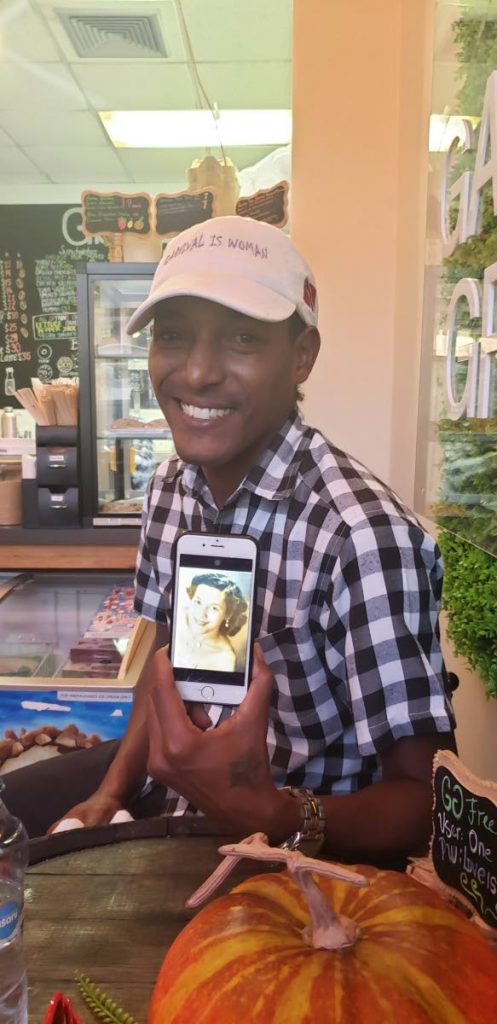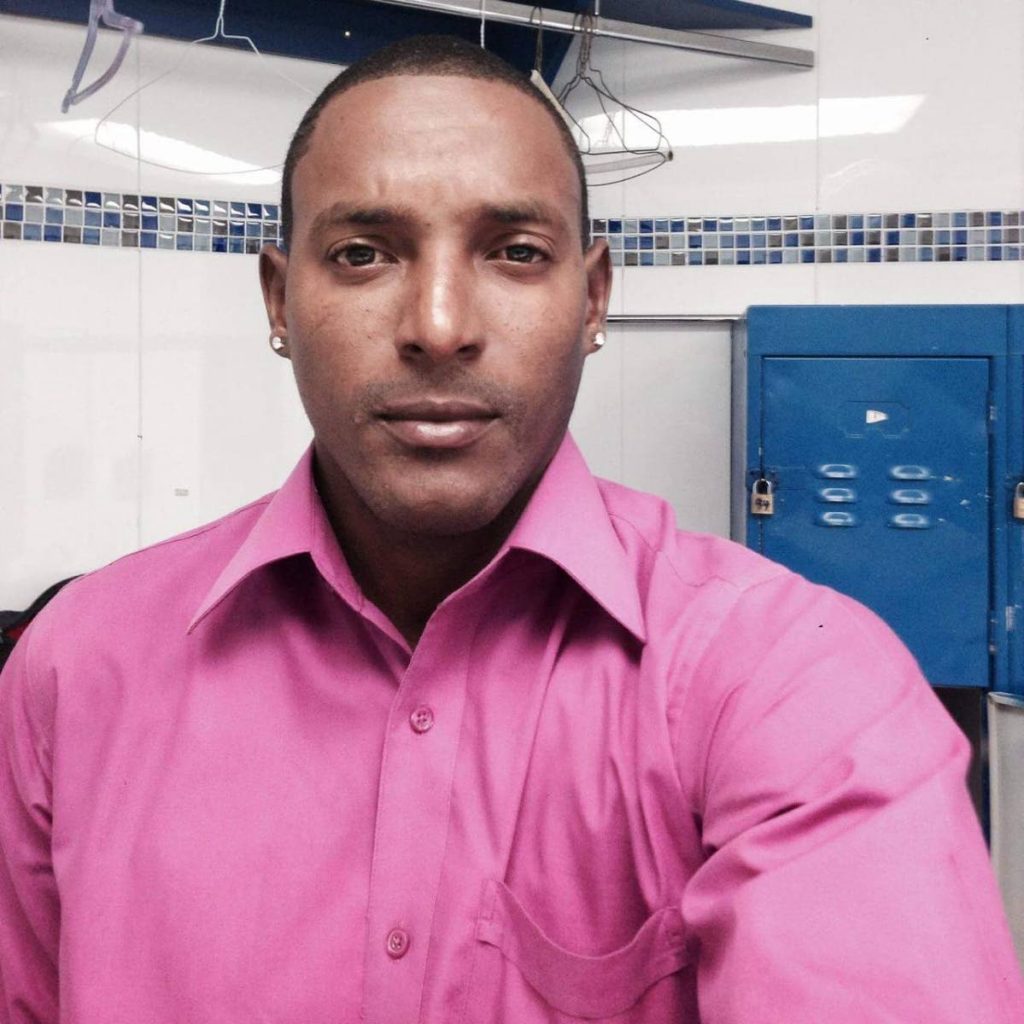Ron Julien was the boy who lived

This is part three of Newsday's Beyond Blood series on different aspects of adoption.
Ron Julien's biological father, Trevor, beat him mercilessly as a child. Fuelled on cocaine, Trevor would get annoyed with Julien if he made a peep in the house.
Julien was mute as a toddler. He feared making a sound that would annoy his father.
Julien, a lifeguard and business owner, met with Newsday in October in Woodbrook to share his adoption story.
Trevor was a customs broker and married with three children. He met Maria, a drug-addict sex worker who got him hooked on coke. The two eventually had Julien, and Trevor moved into Sea Lots with his new family.
Maria was hardly around, and Julien was primarily in the care of his father. From birth to four, Trevor abused him. He was starved, slapped, kicked and made to sleep on the floor. Days would pass and he would be locked in the home alone. Sometimes the neighbours, who had a key for the house, would hear him cry and bring food for him.
"The drugs is what screwed them up...He came home one time and hit me with a piece of iron. There was an occasion he tried to drown me while I was bathing in Sea Lots shoreline. People had to come pull him off me," Julien said.
One day his parents took him to friends who lived in Belmont to play – and left him there.
"It was like the best weekend. I was spoiled...When I first got there, it was overwhelming, because I just got showered with gifts," he said.
The first day he had the time of his life playing at the house.

That day turned into a weekend. The weekend turned into weeks, and eventually Julien realised his parents were not coming back. He was adopted by Ronald and Sadie Drysdale, two retirees who he said saved his life.
That weekend he instantly gained two brothers and five sisters. His youngest sister was 11 years older than him. He was warmly welcomed by his extended family. The Drysdales had many cousins and they all went to the house to see the new child.
"I'd always get taken out by somebody. Every day was almost like a new adventure. They would have birthday parties and friends over. There was not a lack of love. They were a fortunate family. I got everything I needed."
The adoption was not planned. The Drysdales took out ads in the newspaper to find their new son's biological parents, and Julien settled into his new life. Eventually, Trevor and Maria appeared and signed away their parental rights – and Julien finally had loving parents.
"They saved me. I had to undergo emergency surgery for a hernia couple months after when I was five. They were the best thing that ever happened to me."
Two of his new sisters – the youngest and eldest – took on a maternal role in Julien's life.
"My sisters would have had more of a motherly role for me. When I matured, friction came up constantly. They were able to beat me, correct me, punish me.
"That's mainly because my parents were fairly old. I think when they adopted me they would have already been at, like, 50s."
The Drysdale household, Julien said, considered education and discipline important.
"Everyone was well-educated, so that was always a priority. They were supportive. From young I started sports. Swimming was the main one, and then track and field."
He attended Belmont Boys' RC school for a year and transferred to St Bernadette's where his sister taught.
"Primary school was fun, but it was strict. My sister – the last one – she would always be on my case about my penmanship. As I reached home I would have to study for two hours. It was mandatory. Education was really strict. At times I didn't like it."

He went to secondary school at Belmont Intermediate. He used to play cricket with the Harvard Club and football but did not have much family cheering him on from the sidelines.
"I was good at sports, but nobody would come. It was rare. My brother or one sister would come to see me. When I was a child, I would come first in triathlons and friends who came last, their proud family would be there. I came first, with a trophy and cheque, and nobody was there."
His new family was so much older than him that everybody was more involved with their own lives as they had families and jobs that occupied their time. For his parents to see him play, one of his siblings would have had to take them.
"It wasn't that I didn't have support all around because they didn't come out. I had my gear and equipment, and they would happily buy it."
While he was in secondary school Sadie fell ill, and there was tension between him and the sisters. His home was full of strict rules, but Julien always tried to push the boundaries. One day he went swimming, but first went by his best friend, and then called a girl from a payphone. Girls used to call him at home and he would get in trouble. His siblings went to swimming to see if he was there. He was not and he got in trouble. Eventually, he started stealing as a way of getting even with them.
"I started stealing out of rage. I can't fight with them. I can't do nothing. I could only get banned.
"So things that I knew they liked, I stole. My sister had a watch set and I threw it down the manhole.
"These things had a domino effect on me. They used to say, 'You're just like your father.'"
Describing himself as an energetic and miserable teen, he said he made up for the years he didn't talk by chatting back all the time. He was sent to a psychologist and to church, but those spaces never brought him closure. He was put out of his house for being disobedient.
"They made me feel as if something was wrong with me. I was the outside child. Hence the reason why I ended up getting kicked out."
Julien went to live with his best friend Christian on Observatory Street, Port of Spain. He paid his way by working at a bar in Grand Bazaar while studying for his CXC exams.
Sadie died when he was 15. He has a tattoo of her name on his arm, and he went home to see his father.

Julien has no contact with his biological siblings. This year was the first year he had seen his biological brother in over a decade. His father, Trevor, died in 2007. He used to see him on and off, but he was 13 the first time he saw Trevor after the adoption.
"I hated him. I just remember him trying to drown me, abusing me, him having me sleep on the ground and beating me. Those are the vivid memories I have. When I started going to high school, I was walking with my best friend and I saw him across the road. It wasn't due to embarrassment that stopped me, but if my emotions got the better of me, I don't know what I would have done."
His feelings about his father became more conflicted as he got older. On his 13th birthday, his father asked him for money. Julien had been given $100 as a present, and he gave it to Trevor. His sister buffed him, accusing Trevor of using the money to buy drugs, but Julien was so happy to see his father, he did not care. His biological dad said he was coming back to see him, but never did.
His relationship with his mother was different. After she gave him up, Julien never saw her again. He spent nine years looking for her.
He doesn't even remember what she looked like. He went to the Ministry of Legal Affairs and discovered she died in 2009. Her name was Carol Baptiste, but he always knew her as Maria. He thinks giving him up was the best decision she ever made, but he longed to know her.
"I just wanted to see her once. I don't know what my emotion might have been, but I just needed to know. I wrote letters and didn't know if it was going to her or even left the house.
"I was an emptiness. My mom's absence had an impact. I used to watch these shows where a mom would flip a car to save their child, and wonder what was it about me that she didn't want to see."
Julien has since reconciled with his adoptive family. They lime, go on beach trips and his adoptive siblings' children call him Uncle Ron.
"The best thing that could have happened was the adoption. I could have died. I was dying. I had a hernia, and it didn't show up until I was with the family."
He also volunteers with boys from broken homes and similar backgrounds to his. He shares snippets of his past with the boys so they know he relates to their experience, but said his interview with Newsday was the first time he had talked about his story so intimately.
Keep posted to Newsday for the fourth part of the series, on children in the system.


Comments
"Ron Julien was the boy who lived"